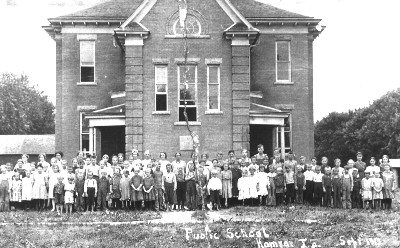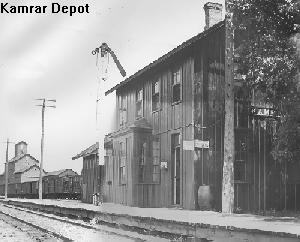Kamrar, Iowa - founded in 1881
By Martin E. Nass
Transcribed for the IAGenWeb Project by Janelle Martin, with permission of Martin "Ed" Nass.

Kamrar High School - built in 1928
The town of Kamrar was founded and platted in 1881 by the Western Town Lot Company,
the real estate division of the Chicago & Northwestern Railroad. It was established
about a mile south of the site of Poland's Grove. It was named to honor Judge J.
L. Kamrar, of Webster City, who performed the legal work for the railroad at the
suggestion of Marvin Hughitt, the general manager. This line was the north-south
connection between Jewell and Webster City, continuing on north to Eagle Grove.
A post office was established here on March 27, 1882. Mr. A. Bonning was the first
postmaster. It was located in the Bohning and Pierce general store. The population
of Kamrar at first was very small. In 1895 there were 130 residents and by 1900 it
had grown to 223. It peaked in 1940 at 288.
The first school was a small one-room frame structure erected in 1884. It was enclosed
by wooden fence. As many as 75 pupils attended each day, so it was very crowded from
the start. Another school , a two-story brick building, was put up in 1901. It had
two rooms on each floor, but only the first floor was used for a while. In 1907 the
ninth and tenth grades were added, and they started using the top floor then. In
1917, when the Locust Grove school was added, an addition to the west side of the
building was required. An eleventh grade was added in 1921 and the twelfth grade
was added in 1922. In the early school days, each day was started with hymn sings
and prayers. This school functioned until 1928 when a whole new building was constructed.
The last graduating class was 1961. After that time, the school joined with the Blairsburg
and Williams Schools to form Northeast Hamilton. The school building was torn down in 1975.
At the time of its creation, Kamrar was located in Boone Township, but a later reorganization
of the townships in 1894 put the the town in Independence Township. Kamar was first
incorporated on June 3, 1896, with the first town elections held twenty days later
on June 23, 1896. The original town plat shows one diagonal street running along
the railroad. It was, naturally, called Railway Avenue. The plat has it incorrectly
spelled "Avanue."
M. L. Perkins was elected to become the first town mayor. Six town trustees elected
were: F. W. Bibler, George A. Wicks, Dr. D. W. McCreary, A. B. Cordes, B. F. Ross,
and A. Bohning. One of the first acts of the council was to order wooden sidewalks,
eight feet wide and nailed to 5 1/2 inch stringers. This sidewalk lasted for nine
years, when it was replaced in 1905.
In 1903 Kamrar got its telephone line, when the Martin Telephone Company of Webster
City installed the system. The switchboard was located in the Sam Thompson home.
Mrs. Kade Thompson was the first operator. A ring code was used by the community
for announcements. Six short rings meant an emergency; alternating long and short
rings signalled school closings or a storm alert. The telephone switchboard has been
preserved and is on display at the Depot Museum in Wilson Brewer Park in Webster
City.

Two other things of interest about Kamrar: Kamrar's main claim to fame would probably be their pride in having
their 1948 girls' basketball team win the State Tournament. They were also runners
up in 1950. Another interesting thing that occurred was when the depot agent came
to work one morning to discover an elephant in back of the depot. It seems that during
a storm the night before, an elephant escaped from the circus and appeared at the
depot. The depot agent telegraphed other towns to report it, causing much mirth among
the railroad men. The account was written up in the book The Kamrar Depot Platform
by JoAnn Bahr about her father. The Kamrar population was 203 according to the 1990
census report.
|